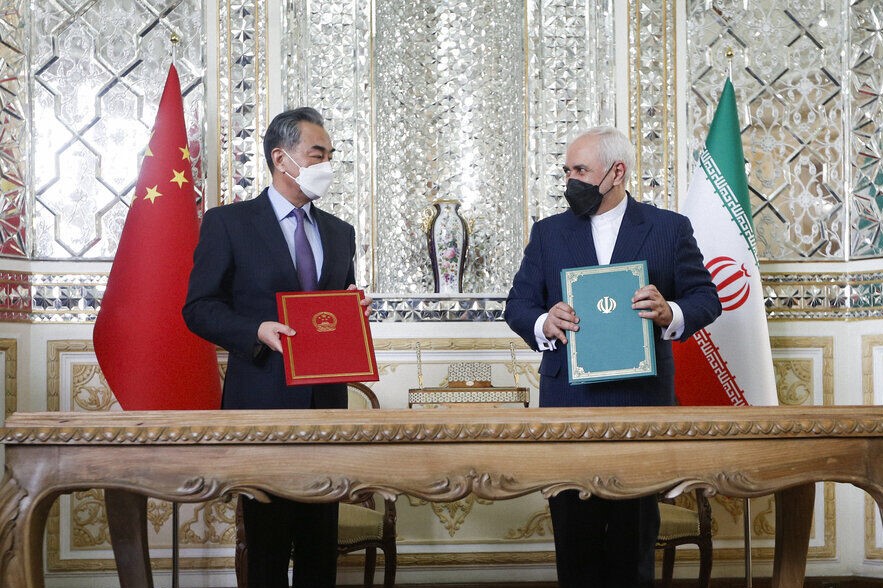Many Iranian top officials have praised the deal, dubbed as the 25-Year Strategic Document, signed between Tehran and Beijing, amid the US’s so-called "maximum pressure" policy enforcing sanctions against the Islamic Republic.
In his meeting with the visiting Chinese Foreign Minister Wang Yi, Iranian President Hassan Rouhani called the deal a "long-term cooperation in deepening ties in all spheres including political and economic", and added that “it will clarify the prospects of the 25-year relations between Iran and China."
He also pointed to the 50th anniversary of Tehran-Beijing diplomatic ties, describing it as "a bilateral cooperation at regional and international levels."
The president highlighted priorities in the field of development and infrastructure projects that need to be "expedited" and expressed gratitude to the Chinese side for supporting the nuclear accord, also known as the Joint Comprehensive Plan of Action (JCPOA).
Rouhani called for an international effort to fight the so-called "maximum pressure" policy of the US enforcing sanctions against the Islamic Republic and maintain multilateralism, while he expressed hope that the trade deficit with China can be addressed in 2021.
For his part, the Chinese foreign minister supported Tehran's Hormuz Peace Endeavour (HOPE) which calls for collective security for the Persian Gulf region to save it from extremism and terrorism, as well as instability caused by US interference.
Wang Yi stressed the importance of the US revoking announced sanctions against Iran and committing to not repeating such actions again. He also said China's cooperation with Iran in the arena of vaccines against Covid-19 as crucial as it is a humanitarian measure and pledged to provide more of the vaccine to Iran.
The Chinese foreign minister who arrived in Tehran on March 26, began his tour with Saudi Arabia and Turkey. He later heads to the UAE, Bahrain and Oman, after a two-day stay in Iran.
Following the signing of the Comprehensive Iran-China Cooperation Program between the Chinese and Iranian foreign ministers on March 27, Iran's Foreign Ministry spokesman Saeed Khatibzadeh wrote on Twitter that “the comprehensive strategic partnership between Iran and China entered a new phase."
Iran's Parliament Speaker Mohammad Baqer Qalibaf also praised the 25-Year Strategic Document with China in a post on his Twitter account on March 28, saying that "signing the Strategic Document with China is an important element in gaining power within the framework of the outlook to Asia and Eurasia with a balanced and economy-oriented foreign policy approach."
In a statement, the Iranian Foreign Ministry announced that the document is only a roadmap and contains no agreement. The document makes no mention regarding the volume of investments to be made by China in the Iranian economy and does not grant a monopoly or hand over land to China, it underlines. However, The New York Times revealed in a report in July 2020 that China's investment in Iran in the following 25 years would total $400 billion.
The deal was first announced in a joint statement on January 23, 2016, when Chinese President Xi Jinping visited Iran. According to Tasnim news agency, Article Six of the agreement states that the two countries expressed their intention to expand cooperation and relations in the fields of energy, infrastructure, industries and technology.
Some experts see Tehran's turn towards the East as an abandonment of the decades-long policy of "Neither East nor West", which was the slogan of the founder of the Islamic Republic of Iran, Ayatollah Ruhollah Khomeini, for the reconstruction of a post-revolution Iran. Meanwhile, in his speech in February 2018, Supreme Leader Ali Khamenei announced that the East is more "preferable" than the West.







 President Ilham Aliyev shed light on the evolving contours of the peace process with Armenia during an international conference in Baku this week. ...
President Ilham Aliyev shed light on the evolving contours of the peace process with Armenia during an international conference in Baku this week. ...
 Azerbaijan and Armenia started the process of demarcation of their border on Tuesday, with the installation of the first border markers based on ge...
Azerbaijan and Armenia started the process of demarcation of their border on Tuesday, with the installation of the first border markers based on ge...
 President Aliyev emphasized the critical role of the North-South Transport Corridor in fostering transport cooperation between Azerbaijan and Russi...
President Aliyev emphasized the critical role of the North-South Transport Corridor in fostering transport cooperation between Azerbaijan and Russi...
 Russian Foreign Minister Sergei Lavrov has reasserted that Moscow has no intentions to stop the fighting in Ukraine, even if peace talks commence.
Russian Foreign Minister Sergei Lavrov has reasserted that Moscow has no intentions to stop the fighting in Ukraine, even if peace talks commence.
 Iran has refuted reports of alleged damage to Shimon Peres Negev Nuclear Research Centre located southeast of Dimona, Israel, during the recent air...
Iran has refuted reports of alleged damage to Shimon Peres Negev Nuclear Research Centre located southeast of Dimona, Israel, during the recent air...



